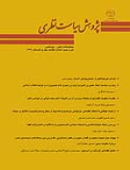مقایسۀ حکومت اقتدارگرا و جایگاه مردم در آن در اندیشۀ «امام محمد غزالی» و «توماس هابز»
محورهای موضوعی : پژوهش سیاست نظریمحمدعلي توانا 1 * , فرزاد آذرکمند 2
1 - دانشگاه شیراز گروه علوم سیاسی دانشکده حقوق و علوم سیاسی
2 - دانشگاه یزد
کلید واژه: اندیشۀ سیاسی دولت اقتدارگرا جایگاه مردم محمد غزالی توماس هابز,
چکیده مقاله :
مقالۀ حاضر به بررسی نظریۀ امام محمد غزالی و توماس هابز دربارۀ حکومت اقتدارگرا پرداخته است. به نظر میرسد هر دو متفکر، نظریۀ حکومت اقتدارگرایی خود را بر اساس طبیعت و سرشت انسان پایهریزی می کنند. غزالی با توجه به صفات چهارگانۀ انسان سعی دارد تا انسانی الهی تربیت کند که تحت حاکمیت حاکم الهی به کنش منفعلانه مبادرت نماید. در مقابل، هابز معتقد است که انسان ها سرشتی جنگجو و قدرتطلب دارند و در وضعیت اولیه و طبیعی بشر، جنگ همه علیه همه در جریان بوده است و انسان ها به حکم عقل، درصدد رهایی از این وضعیت هستند و بنابراین با دوراندیشی خود به تأسیس حکومتی مقتدر حکم داده اند. به نظر می رسد مسئلۀ هر دو متفکر تا حدود زیادی یکسان است، اما شیوۀ پردازش آنان به مسئله متفاوت است. بدین معنا که هر دو متفکر در دورهای پرآشوب زندگی می کردند و نیاز به امنیت سبب میشود هر دو به حکومت اقتدارگرا متوسل شوند. از سویی دیگر، هر دو متفکر برای مردم نقش انفعالی قائل هستند؛ هر چند شیوۀ استدلال غزالی، شرعی و هابز، عقلی است. ضمن اینکه به نظر می رسد نظریۀ عقلانی هابز - با پذیرش امکان شورش- راه را برای فراتر رفتن از حکومت اقتدارگرا باز میگذارد، در حالی که نظریۀ شرعی غزالی به بازتولید گونه ای حکومت اقتدارگرا می انجامد.
This article studies the basics of forming powerful government and the relationship between people with government in Ghazali and Hobbes thought. Special view of both of the thinkers to nature of human is intellectual foundation of forming authoritative government. According to the four human traits, Ghazali tries to educate the divine human that acts passively under divine governance. Since religion and politics don’t separate from each other in Ghazali’s view, so in government, divinity of these traits joins to politics and powerful government. But Hobbes believed that human have power demand and warrior nature in addition, in primary and natural human condition, the war has been going on against each other. And human try to rescue themselves according to their wisdom. So, they established an authoritative government with their foresight. Therefore, the subject of both of them is largely same, but their processing is different. It means that both of these intellectuals lived in restless period, and the necessity of security causes them to resort to authoritative government. On the other hand, both of these intellectuals assign passive roles for people; however, Ghazali’s argumentation method is canonical and Hobbes’s method is rational. Moreover it seems that the rational theory of Hobbes – accepting the possibility of insurgence-paves the way for going beyond the authoritative government, although the canonical theory of Hobbes leads to one type of reproduction of authoritative government.

